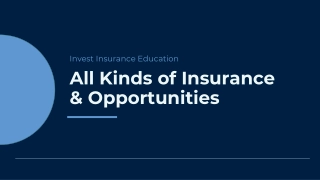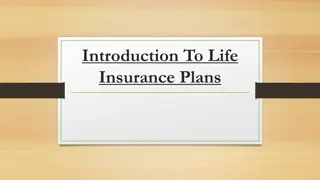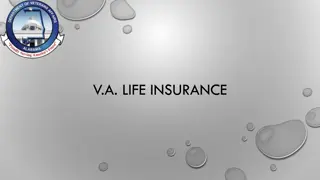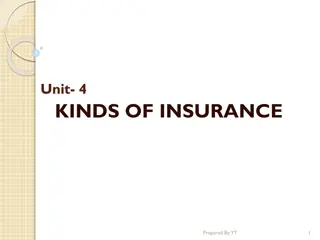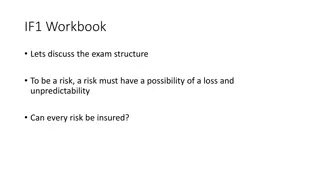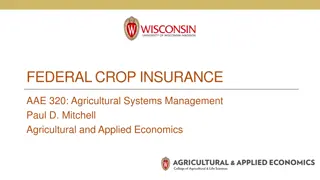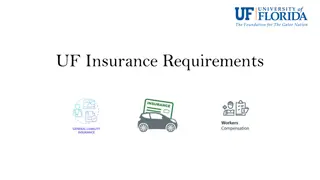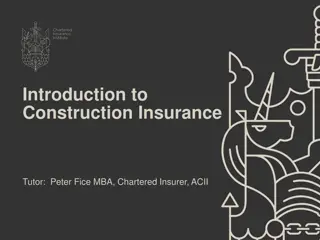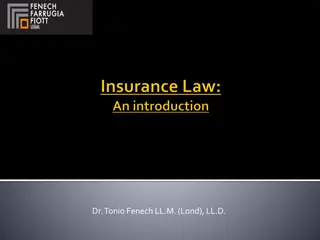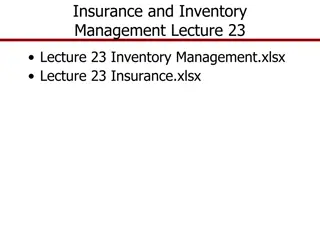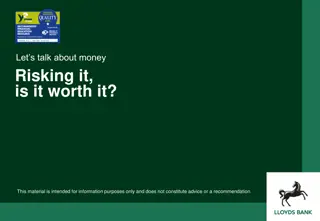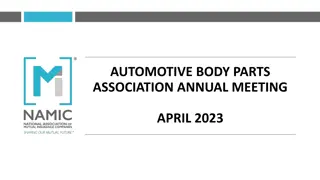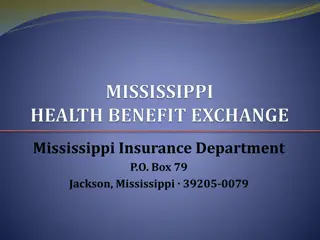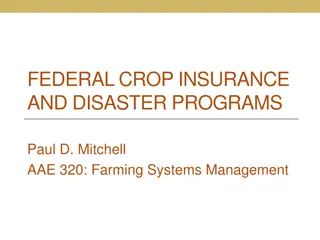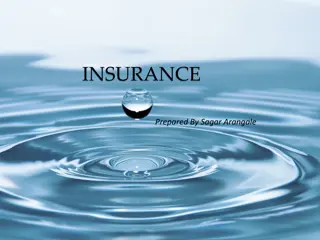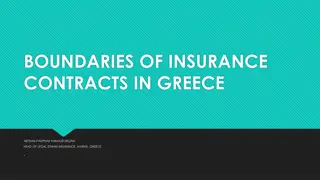Understanding Financial Risks and Insurance: Course Overview
Learn about financial decision-making, protecting against fraud, and mitigating financial risks in this 9-week course. Explore the basics of insurance, including key terminology such as contracts, risk aversion, and premiums. Understand the importance of insurance in managing financial risks and investing wisely.
Download Presentation

Please find below an Image/Link to download the presentation.
The content on the website is provided AS IS for your information and personal use only. It may not be sold, licensed, or shared on other websites without obtaining consent from the author. Download presentation by click this link. If you encounter any issues during the download, it is possible that the publisher has removed the file from their server.
E N D
Presentation Transcript
Financial Risks and Insurance 9 Week Course Outline
Overview In this lesson we will be learning about financial decision making. We will learn how to protect ourselves against fraud and financial scams. We will learn the importance of mitigating financial risks. We will be able to identify common types of risks and basic risk management methods. We will learn the basics of insurance.
Unit Objectives Understand the impact of opportunity cost when making financial decisions Understand the financial risks of investing money Understand the importance of insurance to mitigate risk
Unit 5.1 - Insurance Basics 9 Week Course Outline
Key Terminology What is a Contract?
Key Terminology A Contract is... A legally binding agreement between two parties (people, companies, or both) in which something of value is exchanged. All the following elements are required for a contract to be binding, along with the contract itself must be for something legal.
Key Terminology What is Risk Aversion?
Key Terminology Risk Aversion is... The inclination to choose a more predictable option, with a possibly lower payoff, than a course of action that is less predictable and therefore higher risk.
Key Terminology What is Insurance?
Key Terminology Insurance is... An arrangement where a company or government agency provides a guarantee of compensation for specified loss, damage, illness, or death in return for payment of a premium.
Key Terminology What is a Premium?
Key Terminology A Premium is... The amount of money paid to the insurance company for the insurance policy you are purchasing.
Key Terminology What is a Deductible?
Key Terminology A Deductible is... The amount of money you will pay on an insurance claim before the coverage kicks in and pays the rest.
Key Terminology What is a Claim?
Key Terminology A Claim is... A formal request by a policyholder to an insurance company for coverage or compensation for a covered loss or policy event.
Up Next! Class Activity Watch Intro to Insurance Video
Up Next! Contracts & Risk
Challenge Questions Intro to Insurance In what ways could your actions cause your insurance premium to increase? Contracts (personalfinancelab.com) Risk (personalfinancelab.com)
Challenge Questions Intro to Insurance In what way are you able to reduce your insurance premium? Contracts (personalfinancelab.com) Risk (personalfinancelab.com)
Challenge Questions Intro to Insurance Using examples, explain what a deductible is. Contracts (personalfinancelab.com) Risk (personalfinancelab.com)
Challenge Questions Intro to Insurance Explain what is meant by the term premium when discussing insurance. Contracts (personalfinancelab.com) Risk (personalfinancelab.com)
Challenge Questions Intro to Insurance What do you value enough to get insurance to cover it if it s damaged? Contracts (personalfinancelab.com) Risk (personalfinancelab.com)
Challenge Questions Intro to Insurance In your opinion are you for or against insurance and why? Contracts (personalfinancelab.com) Risk (personalfinancelab.com)
Homework Budget Game
Unit 5.2 - Liability Insurance 9 Week Course Outline
Key Terminology What is Liability Insurance?
Key Terminology Liability Insurance is... For the protection against third-party insurance claims. For instance, someone suffering a loss who is not a party to the insurance contract.
Key Terminology What are Coverage Limits?
Key Terminology Coverage Limits are... The maximum the insurance company will pay for a certain occurrence or claim.
Key Terminology What is Replacement Cost Value?
Key Terminology Replacement Cost Value... Pays you the amount of money needed to cover the replacement of your possessions at current market prices.
Key Terminology What is the Actual Cash Value?
Key Terminology Actual Cash Value is when... Your insurance company will estimate the current value of your items, not the price you paid when you purchased them.
Key Terminology What is the difference between Tort State and No-Fault State?
Key Terminology Tort State means... At-fault drivers in a crash are responsible for paying the other driver's medical expenses and damages. The at-fault driver must also pay for additional damages, such as loss of wages and "pain and suffering."
Key Terminology No-Fault means... Regardless of who caused the incident, everyone is required to file a claim with their own insurance.
Up Next! Types of Insurance
Challenge Questions Types of Insurance What is Renter s Insurance for? Rental Insurance (personalfinancelab.com) Homeowner’s Insurance (personalfinancelab.com) Car Insurance (personalfinancelab.com)
Challenge Questions Types of Insurance What is the purpose of homeowners insurance? Rental Insurance (personalfinancelab.com) Homeowner’s Insurance (personalfinancelab.com) Car Insurance (personalfinancelab.com)
Challenge Questions Types of Insurance Give examples of the type of things that a homeowner policy will cover? Rental Insurance (personalfinancelab.com) Homeowner’s Insurance (personalfinancelab.com) Car Insurance (personalfinancelab.com)
Challenge Questions Types of Insurance What is meant by coverage limits? Rental Insurance (personalfinancelab.com) Homeowner’s Insurance (personalfinancelab.com) Car Insurance (personalfinancelab.com)
Homework Stock Game Manage Team Portfolios
Unit 5.3 - Health and Life Insurance 9 Week Course Outline
Key Terminology What is Life Insurance for?
Key Terminology Life Insurance... Pays out a sum of money either on the death of the insured person or after a set period.
Key Terminology Who is the Policy Owner?
Key Terminology A Policy Owner is... The person who is responsible for paying the premiums on the policy and is the legal owner of the policy.
Key Terminology What is the difference between the Insurer and the Insured?
Key Terminology The Insurer is... The insurance company, the entity the policy owner pays in exchange for life insurance coverage.




